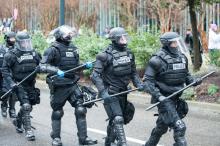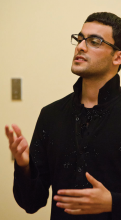bravery

Critics mock that success at football does not qualify Kaepernick to speak on social issues. Yet the athletes of the NFL have achieved their elite status through years of focus, passion and training in an industry that is inextricably tied to conceptions (right or wrong) of black and brown masculinity and success. They are probably more qualified than anyone to comment on the intersection of strength, fear, security, and vulnerability that undergird the state-sanctioned brutality in America’s streets.

Women are showing that, despite being subject to the most violent and forceful manifestations of our patriarchal society and culture, they are willing to stand up in defiance and in solidarity to ensure that we as a society no longer allow incidents of sexual harassment and violence to go unchallenged, unnoticed, and unbelieved. And almost certainly, many other women who have experienced harassment or assault have decided understandably not to speak out. “Survivors don’t owe us their stories” explained Alexis Benveniste on twitter.

THE ULTIMATE BRAVERY might well be the courage to forgive one’s enemies and hold on to hope.
Nelson Mandela famously emerged from 27 years in prison as a reconciler and uniter, somehow free from bitterness and hatred. He was able to put into practice Jesus’ call to love our enemies—and thus became the father of the new South Africa.
Far from the upper echelons of power and fame, forgiving our enemies can be a difficult task, since “enemies,” by their very definition, aren’t easy to love. But in places of oppression, occupation, and routine violence, it’s even harder.
Take, for example, the story of a young man named Yousef Bashir. He grew up in the Gaza Strip, near an Israeli settlement known as Kfar Darom. In 2000, Palestinians rose up in protest against the Israeli occupation in what became known as the Second Intifada. In response, Israeli soldiers came to Yousef’s house and told his family to leave.
His father had dedicated his life to teaching Yousef and his brothers “how to coexist with the Israelis,” Yousef explained over lunch in Philadelphia early this winter, and he insisted on staying in their long-time family home. As a result, Yousef said, Israeli soldiers moved into the Bashir family’s house when he was 11 years old. They occupied the house until he was 15.
NO ORDINARY MEN: Dietrich Bonhoeffer and Hans von Dohnanyi, Resisters Against Hitler in Church and State is a tightly woven story framed by the sophisticated historical analysis of its two authors, former senior Farrar, Straus, and Giroux editor Elisabeth Sifton (daughter of theologian Reinhold Niebuhr) and Columbia University professor emeritus Fritz Stern, a famed German scholar. The book profiles two brave young men—Bonhoeffer, a theologian and minister deeply involved in fighting the Nazis’ efforts to control the German Protestant churches, and Dohnanyi, a brilliant lawyer (son of Hungarian composer Ernst Dohnanyi) working in the German Ministry of Justice, who used his key position to methodically collect evidence against the Nazi regime.
Sifton and Stern portray Dohnanyi in detail as a leader in the small but high-powered German resistance movement. Brig. Gen. Hans Oster, a resistance member, hired Dohnanyi away from the Ministry of Justice ostensibly to help run the Abwehr, a German military intelligence organization that was also the center of the anti-Hitler resistance, in 1939. Dietrich Bonhoeffer was then recruited by Dohnanyi to be part of this team. Dohnanyi’s wife, Christine (Bonhoeffer’s sister), is also revealed as a significant influence on and aide to her husband.
The slim, 157-page volume is an important new historical work in the growing field of research on the German resistance movement during World War II. It is a penetrating look at Dohnanyi’s dangerous operations against the Nazis with historical perspective that other books on him and Bonhoeffer lack. Earlier biographies, written mainly by church people, more or less emphasized Bonheoffer as a singular hero fighting Hitler. Bonhoeffer was indeed very brave and traveled thousands of miles abroad while working as an agent for the Abwehr, but he was just one of a circle of resisters.